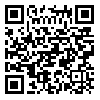Volume 19, Issue 3 (Paramedical Sciences and Military Health- Autumn 2024)
Paramedical Sciences and Military Health 2024, 19(3): 49-59 |
Back to browse issues page
Download citation:
BibTeX | RIS | EndNote | Medlars | ProCite | Reference Manager | RefWorks
Send citation to:



BibTeX | RIS | EndNote | Medlars | ProCite | Reference Manager | RefWorks
Send citation to:
Ebrahimkhani M, Malkian A, Jamshidi F, Esmaili F. Investigating the Impact of Holding Training Sessions Based on the Health Belief Model on Teachers' Attitudes in Promoting Breast Cancer Prevention Behaviors. Paramedical Sciences and Military Health 2024; 19 (3) :49-59
URL: http://jps.ajaums.ac.ir/article-1-432-en.html
URL: http://jps.ajaums.ac.ir/article-1-432-en.html
1- Department of Health Psychology, Faculty of Medical Sciences, Islamic Azad University, Najafabad Branch, Isfahan, Najafabad, Iran. , e.kmehdi@yahoo.com
2- Department of Psychiatry, Faculty of Medical Sciences, Isfahan University of Medical Sciences, Isfahan, Iran.
3- Department of General Psychology, Faculty of Humanities, Islamic Azad University, Saveh Branch, Saveh, Iran.
4- Department of Clinical Psychology, Faculty of Medical Sciences, Islamic Azad University, Hamadan Branch, Hamadan, Iran.
2- Department of Psychiatry, Faculty of Medical Sciences, Isfahan University of Medical Sciences, Isfahan, Iran.
3- Department of General Psychology, Faculty of Humanities, Islamic Azad University, Saveh Branch, Saveh, Iran.
4- Department of Clinical Psychology, Faculty of Medical Sciences, Islamic Azad University, Hamadan Branch, Hamadan, Iran.
Abstract: (3549 Views)
Introduction: Cancer is one of the chronic and non-communicable diseases. Moreover, its importance is obvious to everyone considering the change in the incidence of diseases in the world and the tremendous psychological and economic impact of this disease on the foundation of the family, society and community. Breast cancer is the most common cancer and the second cause of cancer-related death in women in Iran. The most important way that can be used for prevention is effective and comprehensive health education. Considering that one of the best models for studying behavior in health education to prevent and control diseases and especially cancers is the health belief model, the current research was conducted with the general aim of investigating the effect of holding educational sessions using the health belief model method on teachers' attitudes in breast cancer prevention.
Materials and Methods: In this semi-experimental study, 50 female teachers (25 in the test group and 25 in the control group) were selected in Kabudarahang city in 1401. Moreover, it is an intervention in which the effect of the educational program in promoting cancer prevention behaviors was investigated among the teachers of Kabudarahang city. The Champion questionnaire including demographic information, and HBM structures (perceived sensitivity, benefits, barriers, self-efficacy and indications for action) was used to measure health beliefs. Data were collected in two stages before and after the experiment based on the health belief model and they were analyzed through chi-square, independent and paired t statistical tests with SPSS software version 24.
Results: The paired t-test showed a statistically significant difference regarding the knowledge and attitude of the test group before and after the training (p>0.05). In addition, the independent t-test, which compared the two groups, showed a statistically significant difference in all the components of the health belief model including sensitivity, benefits, obstacles, self-efficacy (except for the practice guide) after the educational intervention (p>0/001).
Conclusion: The present study confirmed the effectiveness of the health belief model in promoting breast cancer prevention behaviors and training based on the health belief model improved the participants' performance. Therefore, it is suggested to use this educational model in other educational and prevention programs.
Materials and Methods: In this semi-experimental study, 50 female teachers (25 in the test group and 25 in the control group) were selected in Kabudarahang city in 1401. Moreover, it is an intervention in which the effect of the educational program in promoting cancer prevention behaviors was investigated among the teachers of Kabudarahang city. The Champion questionnaire including demographic information, and HBM structures (perceived sensitivity, benefits, barriers, self-efficacy and indications for action) was used to measure health beliefs. Data were collected in two stages before and after the experiment based on the health belief model and they were analyzed through chi-square, independent and paired t statistical tests with SPSS software version 24.
Results: The paired t-test showed a statistically significant difference regarding the knowledge and attitude of the test group before and after the training (p>0.05). In addition, the independent t-test, which compared the two groups, showed a statistically significant difference in all the components of the health belief model including sensitivity, benefits, obstacles, self-efficacy (except for the practice guide) after the educational intervention (p>0/001).
Conclusion: The present study confirmed the effectiveness of the health belief model in promoting breast cancer prevention behaviors and training based on the health belief model improved the participants' performance. Therefore, it is suggested to use this educational model in other educational and prevention programs.
Type of Study: Research |
Subject:
full articles
Received: 2024/09/14 | Accepted: 2024/09/23 | Published: 2024/09/26
Received: 2024/09/14 | Accepted: 2024/09/23 | Published: 2024/09/26
Send email to the article author
| Rights and permissions | |
 |
This work is licensed under a Creative Commons Attribution-NonCommercial 4.0 International License. |





